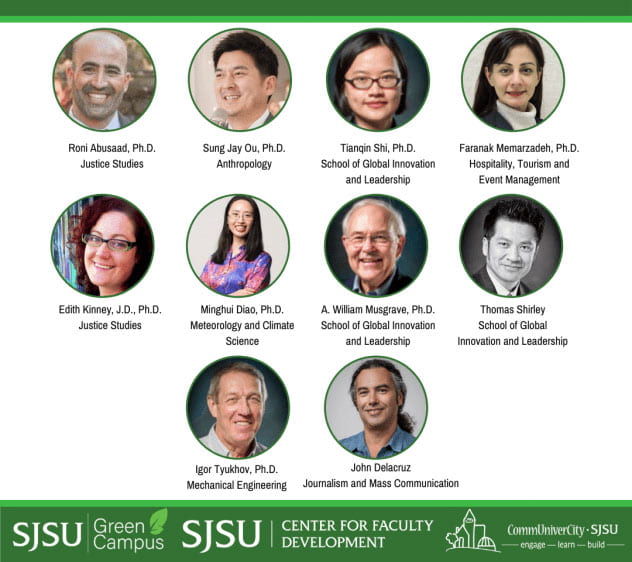
Ten SJSU faculty have been selected for the Sustainability Faculty Cohort: top row, l-r: Lecturer Roni Abusaad; Lecturer Sung Jay Ou; Assistant Professor Tianqin Shi; Assistant Professor Faranak Memarzadeh; second row l-r: Associate Professor Edith Kinney; Associate Professor Minghui Diao; Lecturer A. William Musgrave; Lecturer Thomas Shirley; bottom row l-r: Lecturer Igor Tyukhov; and Associate Professor John Delacruz. Image courtesy of the Office of Sustainability.
San José State Justice Studies Lecturer Roni Abusaad is excited to incorporate a module on the environment and human rights law as part of his Human Rights and Justice course this fall.
“This is an evolving area of human rights law and a great opportunity for students to understand the interconnectivity of all rights and connect theory to current issues like climate change,” Abusaad said at a May 24 faculty presentation.
Abusaad is one of 10 SJSU faculty members who are prepared to lead the way in the university’s inaugural Sustainability Faculty Cohort, who will include sustainability modules into their curriculum this fall. The cohort complements existing extracurricular and co-curricular initiatives offered through the Office of Sustainability, the Campus Community Garden and the Environmental Resource Center and offers a chance for faculty to become campus leaders in sustainability education.
The Center for Faculty Development, the Office of Sustainability and CommUniverCity hosted an informational workshop for SJSU faculty this spring to offer information about sustainability and how they could apply for a stipend to develop a sustainability module for their courses.
“There are many different definitions of sustainability,” said SJSU Professor of Geology and Science Education Ellen Metzger, who helped organize the initiative. “In our workshop, we defined it in terms of the three ‘e’s: economy, equity and environment. We used those three pillars to invite faculty to envision where their discipline might connect to one of the themes of sustainability.”
The workshop also highlighted the 17 United Nations Sustainable Development Goals (SDGs), which were adopted by all UN Member States in 2015 as part of The 2030 Agenda for Sustainable Development. The SDGs provide a “global blueprint for dignity, peace and prosperity for people and the planet, now and in the future” and supply a framework for interdisciplinary teaching and learning about sustainability. Earlier this year, the Times Higher Education (THE) Impact Rankings, which measure worldwide progress around SDGS, ranked SJSU in the top 30 universities among U.S. universities and in the top 500 internationally.
While students have many opportunities to learn about sustainability on and off campus, the faculty cohort ensures that Spartans can learn discipline-specific applications in areas such as hospitality and tourism management, business development, mechanical engineering and more.
“Higher education has a transformative influence on society, and if we want to empower students to become agents of change, it’s going to require us rethinking how we do things,” said Metzger.
“Universities, both in terms of teaching and research, are really well-poised to lead this reframing. What do we want the future to look like? If we want to contribute to achieving the Sustainable Development Goals, we must accept that nothing will change unless education changes.”
The desire to become campus sustainability leaders is evident at SJSU. More faculty applied to participate in the inaugural cohort than could be accommodated this fall. Metzger said that the applications demonstrated a hunger to emphasize sustainability in all disciplines — great news, considering that the Office of Sustainability hopes to continue the cohort program indefinitely.

The Campus Community Garden is just one of the many sustainability initiatives at SJSU. Photo by David Schmitz.
“Our campus has made amazing progress to make our facilities sustainable, from incorporating recycled water in all of our non-potable uses to installing solar panels on every suitable surface. I think this initiative builds on that foundation,” said Senior Utility and Sustainability Analyst Debbie Andres, ’07 Chemical Engineering.
Participating faculty will receive a $500 professional development grant courtesy of PepsiCo and are encouraged to share their experiences with other faculty at future Center for Faculty Development workshops.
“We have always offered amazing courses in every college that focus on sustainability, showing that it can and should be incorporated into every department,” continued Andres. “But we have never had a formal cohort dedicated to curriculum development. We saw how successful and well-attended our workshop was and we plan on this being the start of annual workshops.”
“Together faculty can help students develop the skills, knowledge and outlooks that will help them see themselves as change agents and offer opportunities to make a difference,” added Metzger.
